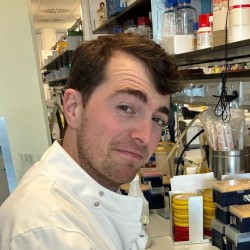
Jordan Pascoe
"The University of Surrey has a longstanding history of pioneering research into tuberculosis, led by a wealth of experienced scientists. Not only does the University have the specialised laboratories required to handle a category 3 pathogen, but it also has state-of-the-art equipment available to postgraduate students."
Course
Biosciences and Medicine PhDPlease provide a brief synopsis of your research project.
Mycobacterium tuberculosis (M. tuberculosis), the causative agent of tuberculosis, is a deadly pathogen that requires a lengthy and complex treatment course. The principal reason for this is that M. tuberculosis has the remarkable ability to effectively tolerate a multitude of antibiotic classes. This bacterium demonstrates exceptional metabolic flexibility, rapidly responding to mitigate antibiotic-induced stress whilst still producing the metabolites it needs for essential cell functions, such as energy production. The focus of my research has been to understand the role of this metabolic response to antibiotics and how this leads to the development of antimicrobial resistance. Through improving our understanding of the mechanisms that M. tuberculosis employs to tolerate treatment, we’ve been able to develop novel approaches to enhance antibiotic activity and even prevent the emergence of resistance.
Why did you choose to study at Surrey for your PhD?
The University of Surrey has a longstanding history of pioneering research into tuberculosis, led by a wealth of experienced scientists. Not only does the University have the specialised laboratories required to handle a category 3 pathogen, but it also has state-of-the-art equipment available to postgraduate students.
"Other PhD students and researchers within the labs have served as an invaluable support network and I would not have been able progress without them. The technical support staff at Surrey have also been particularly amazing, maintaining the facilities to ensure I can conduct my research."
Why are you passionate about your area of research?
Antibiotic resistance is a major impediment to tuberculosis disease control. We now have practically incurable 'extremely drug-resistant' strains of tuberculosis circulating in many countries. It is my hope that, through my research, I can help support the wider biology field in the development of therapeutics and ultimately save lives.
Read more about Jordan's research in a blog published by the Microbiology Society.
Have you had opportunities to collaborate with others during your PhD?
I have been extremely fortunate to collaborate with multiple organisations during my PhD, both within the UK and internationally. At Surrey, I’ve had the opportunity to work with postgraduate students across faculties to develop novel techniques to study host-pathogen interactions at the single cell level.
One of the highlights of my PhD has been working with external collaborators at Kings College London to develop novel therapeutics in the battle against tuberculosis. I also had the opportunity to conduct a research placement at the University of California (Irvine) to study protein-drug interactions. These experiences have allowed me the rare opportunity of undertaking a project from fundamental scientific findings through to early therapeutic development.
What support have you had?
During my PhD, I had the fantastic support of my supervisor Dr Dany Beste. Dany is an extremely passionate researcher who adores science and it made the PhD process exciting and engaging. She has been incredibly supportive of my career development and facilitated several collaborations to benefit my research and advance my skill set.
Other PhD students and researchers within the labs have served as an invaluable support network and I would not have been able progress without them. The technical support staff at Surrey have also been particularly amazing, maintaining the facilities to ensure I can conduct my research.
What do you plan to do once you've finished your PhD?
My plan is to stay in research and try to leverage the skills I have developed in fundamental biology and medicinal chemistry, bridging the gap between the two disciplines.
Find out more about our Biosciences and Medicine PhD.


